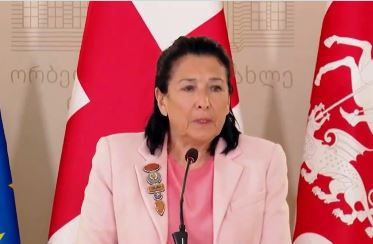In a move aimed at defusing tensions sparked by a controversial “foreign agents” bill, Georgian President Salome Zourabichvili vetoed the legislation on Saturday, Al Jazeera reported.
The bill, which has drawn widespread criticism and triggered unprecedented protests, has raised concerns both domestically and internationally about its potential impact on Georgia’s democratic credentials and its European Union aspirations.
President Zourabichvili’s veto, however, may only serve to delay the proposed law, as the parliament retains the power to override it with an additional vote. The bill, proposed by the ruling Georgian Dream party and passed by Parliament earlier this week, requires non-governmental organizations (NGOs) and media outlets receiving more than 20 percent of their funding from abroad to register as entities “pursuing the interests of a foreign power.”
“Today, I vetoed the Russian law. This law, in its essence and spirit, is fundamentally Russian, contradicting our constitution and all European standards. It thus represents an obstacle to our European path. This law must be repealed!,” President posted on X following exercise of Veto.
Critics have likened the legislation to Russian laws aimed at stifling dissent, citing its potential to curtail media freedom and civil society activities. The bill imposes hefty fines on non-compliant organizations, further fueling concerns about the erosion of democratic norms in the country, Al Jazeera reported.
If they refuse to do so and to disclose sensitive information about foreign funding, they will face a fine of 25,000 lari (USD 9,360), followed by additional fines of 20,000 lari (USD 7,490) for each month of non-compliance thereafter.
On Tuesday, Georgia’s Parliament passed the bill proposed by the Georgian Dream party, which has been in power since 2022.
The party has enough votes in the parliament to overturn the president’s veto with a simple majority.
Prime Minister Irakli Kobakhidze, who belongs to the Georgian Dream, has signalled his party’s readiness to consider Zourabichvili’s proposed amendments to the law, should she lay them out in her veto document.
But Zourabichvili – who is at odds with the governing party – has ruled out the prospect of entering “false, artificial, misleading negotiations” with Georgian Dream.
Giorgi Revishvili, a political analyst, told Al Jazeera that, despite the Georgian Dream having the majority to override the veto, it was important for the president to make the move.
“The president rightfully said how it [foreign agent’s law] is a Russia law and contradicts all of European standards,” Revishvili said.
“There is also a fundamental shift in the political landscape, with the younger generation becoming increasingly involved in politics. The youth are the driving force behind these protests,” he added, Al Jazeera reported.
The foreign agents bill has had mass protests against it rattling Georgia’s capital, Tbilisi for the past few weeks.
NGO and media organisations fear being forced to close if they do not comply. Eka Gigauri, head of the Georgian branch of Transparency International, the anticorruption NGO that has operated in the country for 24 years, told France24, “The implication would be that they might freeze our assets.”
Critics have argued that the draft law would limit media freedom and jeopardise the country’s bid to join the EU, Al Jazeera reported.
Opponents of the bill also said that it would move Georgia closer to Russia. The two former Soviet countries have had a strained relationship since Georgia’s independence following the collapse of the Soviet Union in 1991.
Ursula von der Leyen, president of the European Commission, warned on May 1 that Georgia was “at a crossroads.”
“EU member countries are very clear that if this law is adopted, it will be a serious obstacle for Georgia in its European perspective,” EU spokesman Peter Stano added.
Georgia applied to be part of the EU in 2022 and was granted candidate status in December last year, Al Jazeera reported.
The US has also been urging Georgia against approving the bill, saying it would be inconsistent with its stated goal to join the EU and have a relationship with NATO.
The Georgian Dream party has insisted it is committed to joining the EU, and portrays the bill as aimed at increasing the transparency of NGO funding.-ANI


